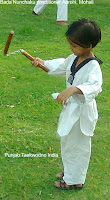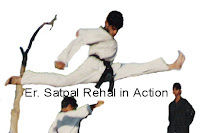

Taekwondo is known as one of the oldest self defence






__________________________________________________________________
What is Taekwondo?
Taekwondo is one of the most systematic
and scientific Korean Traditional Martial Art
of self-defence that teaches more than physical
fighting skills.It is a discipline that shows ways of
enhancing our spirit and life through training
our body and mind. Taekwondo is characterized
by fast, high, jumping, spinning kicks and quick
foot work. It is an all-aroundprogram that offers
self-defence training, physical exercise, and
artistic expression; all taught by an experienced
professional instructor. Today, Taekwondo has
become one of the most practiced martial arts in
the world, its popularity is mainly due to its
spectacular techniques and its being fun. It has
also become Global sport that has gained an
international reputation and stands among the
official games in the Olympics.
Taekwondo is known as one of the oldest self defence
Systems in the world. It is distinct from Chinese Kungfu and
Japanese Karate. Taekwondo is distinguished from other
Martial Arts in its high degree of sophistication, technical
efficiency as well as the over all fitness developed in its students
It is also known for its deadly knock out kicks. Although
it inculcates most of the karate and Kungfu techniques
but it is very different from many such Oriental martial
arts. First, physically it is very dynamic with active
movements that include a mirage of foot skills; second,
the principle physical movements are in simpatico with
that of the mind and life as a whole. Third it possesses
dynamic poses from another perspective.
Taekwondo is a physical expression of the human
will for survival and activity to fulfil the spiritual desire
of a human. Basically all the actions in Taekwondo are
developed from the human instinct for self defence
Reinforced with positive elements as needs arise
and ultimately reach the absolute state to overcome
ego and arrive at the moment of perfection, thus
giving the sport a philosophical dimension.
Taekwondo is an overall sport for the whole
physical system, generating energy in every
organ of the body, developing the muscles and
stimulating the brain and thus developing the
will to action, because in it one has to move all
the muscles and joints of the human body.
Taekwondo is a sport that responds rationally to
survival needs those for physical survival in the
human habitat and also those to harmonise with
inner demands for preservation and balance and
also maintains an orderly system uniformly related
to the inner or outer environments of the human
being.
Taekwondo is a complex of highly related
postures of systematic, scientific acts to move
all parts of the body, therefore , Taekwondo
has become an essential element to prescribe
and maintain the order of human functions.
The human body is not free of physical rules
and it is in a way a machine that grows,
develops and moves. This human machine
works for various effects by transforming
postures into suitable shape, spiritually it thinks as
enlightened and imagines in the process of mental
Benefits of Taekwondo
Taekwondo was originally developed to preserve
ife and for self-defence, but today, adults and
children have many reasons for wanting to train
in Taekwondo. Some want to learn self-defense,
others want to fight in tournaments, some seek
to become physically fit, some seek the social
interaction, while others just want to have fun.
Modern Taekwondo has developed proven teaching
methods that not only help people learn Taekwondo
quickly and easily, but also provide a wide range of
benefits for students of all ages.
Social interaction gained through Taekwondo
training has been found to be a buffer against
the stresses of life for adults, and with long-term
continued practice it fosters greater independence.
With progressive training, children become more
enthusiastic, optimistic, and self-reliant. Many
anecdotal reports from parents tell how their children,
both males and females, do better at home and at
school, both behaviorally and academically.
Taekwondo practitioners seek to develop an
appreciation for the martial art, achieve physical
fitness, improve mental discipline and emotional
stability, develop self-defence skills, and to develop
respect and responsibility. Taekwondo helps
practitioners develop balance and harmony
between their physical and moral selves. It stresses
responsibility for self, family, community, and to society.
Self-defence is an important Benefit of Taekwondo.
Self-defense is not just using defences and counterattacks
against attackers. It is the ability to prevent injury to oneself
or others from attackers. This includes learning to fall safely,
to communicate with aggressors, and to escape from violent
situations. Self-defence is not just concerned with physically
dealing with violence; it is mostly concerned with avoiding
becoming a victim of violence.
The physical benefits of Taekwondo include
improvements in coordination, agility, flexibility,
balance, muscular strength, and endurance.
Taekwondo promotes a healthy lifestyle that includes
a healthy mixture of nutrition, training, and rest. Physical
development also helps develop self-confidence.
Self-confidence is based on self-improvement,
as opposed to confidence based on the ability to perform
a task. This type of self-confidence does not come from
being a winner in competition; it comes from the feelings
of self-worth that are derived from improving oneself.
Belt advancement provides a means to document personal
achievement. Advancement requires setting a goal and
working toward its attainment, which builds confidence and
a feeling of self-worth.
Training in Taekwondo increases one's self-concept
(the beliefs that you have about yourself, as opposed to
understanding who you are via other people's opinions
of you). For instance, it has been found that women
raining in Taekwondo have a greater physical, personal,
social, identity, and satisfaction self-concept. Students
who are more self-confident and compete in Taekwondo
tournaments are more likely to win their bouts.
The moral benefits of Taekwondo include development
of good character, self-control, and a non-violent attitude.
Taekwondo stresses showing respect for oneself, fellow
students, instructors, parents, elders, and members of the
public.
Humility is a quality of all serious Taekwondo
students. Although practicing Taekwondo boosts
self-confidence, this does not convey a false sense
of superiority. On the contrary, a good student should
be humble and considerate
Psychologically, Taekwondo reduces tension
and anxiety by teaching students to control aggression
and by giving them a healthy way to vent hostility and
frustration. Taekwondo is a psychological leveler.
Students with quick, hot tempers learn to control their
emotions. Students who are meek and mild learn to be
more assertive when needed.
Taekwondo is an artistic discipline that allows
artistic expression. There are strict standards for the
performance of techniques but there is still some
latitude for self-expression. Taekwondo movements
nd techniques express beauty and grace and allow
students to strive continuously to develop and improve
heir artistic presentation.


